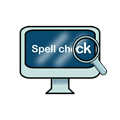 |
Do I really need to bother with correct spelling when there's a computer spell-checker to help me? Surely it will do all the work for me? |
 |
Don't you believe it! There are thousands of words which will fool the computer. |
Look at these examples:
1. In English there are many words which sound exactly the same but have
different spellings for different meanings for example:
 |
 |
| I don't eat meat | Pleased to meet you. |
These words are called homophones from the Greek words;
homo: the same and phonos: sound.
Some more examples:
|
site/sight
|
|
deer/dear
|
|
new/knew
|
|
peace/piece
|
|
principal/principle
|
2. Some words sound nearly the same. For example:
| I accept your apology. | I'll eat anything except bananas. |
3. The wrong spelling may make another real word. For example:
| Do you know what time the film starts? | No, sorry, I don't now. |
 |
In all three examples above, a spell-checker would not help. If you use the wrong spelling, the computer would not spot your mistake. |
4. Even with words which are not homophones, you must be able to get the word nearly right - or the spell-checker cannot help. For example,
| A student was trying to spell the word anxious. |
| (Click on the ear to hear the word) |
| She tried: | Result: |
| angshus | the spell-checker suggested anguish |
| ancshus | the spell-checker had no suggestions |
 |
The Spellzone course teaches common word endings such as -cious, -tious and then follows this up by teaching any 'Rule-breakers'. |
| Click here to go to a page with a Rule Breakers section. | |
 |
5. Most of us need to write in longhand sometimes and a computer
spell-checker is no use then. For example:
|
A last word on spell checkers:
The computer would not spot any of the mistakes in this poem. How many
can you spot?
| |
||
|
AN OWED TO THE SPELL CHEQUER (CANDIDATE FOR A PULLET SURPRISE) Reproduced by kind permission of The Journal of Irreproducible
Results Eye ran this poem threw it, ...............................and there are 7 more verses like this. |
||
There are 25 mistakes in the title and the first two verses of this poem - but as they are all real words, the computer spell-checker would not spot them. The author says his complete poem has 225 words, 127 of which are wrong but would not be picked out by a spell checker.
The Spellzone course pays special attention to words the computer spell-checker would not spot:
See more samples of homophones, with learning tips.
Try one type of homophones test from free unit 13H
Try a different type of homophones test from free unit 13H
After the full Spellzone course, you may well be better at spelling than the computer!
There are six free spelling units which are free to all users:
Entry to the rest of the spelling course is by subscription, at a very low cost
For further information on any of these topics, please click on the link:
Spelling as part of an English language course
Is Spellzone suitable for children?
 |
Go to the next Unit: Learning Tips
to help improve your spelling. |
The Spellzone interactive course is intended to be used online and may not be printed.
"Thank goodness for Spellzone during this remote learning phase. The site is easy for students to navigate independently and they're really enjoying the activities and spelling games. You get an awful lot for your money with Spellzone. Really reassuring is the very prompt response with helpdesk queries. I've very rarely needed the helpdesk, but when I have, the issue has been addressed and sorted within a very short time."
Sarah Taggart, Oasis Academy Lord's Hill